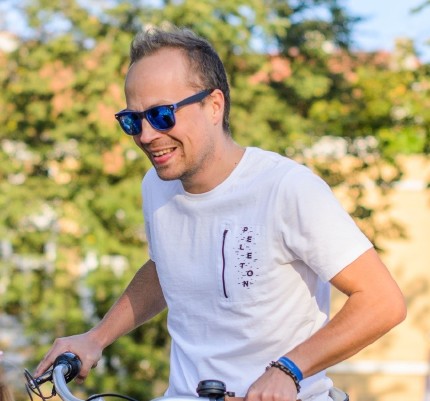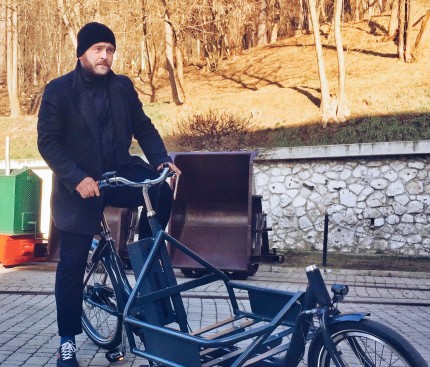Special Feature: Behind the Scenes of LOW-CARB in Poland
The who’s who and how they turn the wheels of change
The LOW-CARB project is represented by two partners in Poland, Skawina Commune and City of Krakow, which together make up a unified Functional Urban Area (FUA). LOW-CARB’s innovative activities will strengthen the cohesion of the FUA by bettering its sustainable mobility and transit options. The pilot projects and capacity-building trainings are respectively steer-headed by two intriguing experts, Maciej Zacher and Łukasz Franek.

Maciej Zacher of Gmina Skawina
- I'm a generalist, activist, eco-social innovator, city lover and civil servant, and an academic teacher.”
Maciej is a European Placemaking Leader and is deeply involved in Placemaking Europe. He is also a member of the Society of Polish Town Planners and Society Together for Nikiszowiec. His notable expertise covers working closely with local communities and children to facilitate creating the spaces they want and need in order to strengthen communities. Maciej was offered a position in the public sector and joined Gmina Skawina.
“My experience as a person on the front-line when working with communities has at times, been a little unorthodox– [I can sometimes find myself] working more with activists than civil servants... but they help me to better understand people's needs directly from the people. I'll gladly empower those who seek the common good. I believe that we need to change the way we work as civil servants because bureaucracy can often be slow the streets are fast.”
Maciej has led community-based projects for many many years in the arena of sustainability, tackling local storm-water management issues and his main field of interest, sustainable urban mobility.

Lukasz Franek, Director of the Public Transport Board of Krakow (Zarząd Transportu Publicznego w Krakowie)
Lukasz is the Director of the Public Transport Board of Krakow and has a national reputation of being a strong agent of change in sustainable mobility. He eats, sleeps, and breathes sustainable mobility exercising any opportunity (whether on the clock or off) to make his area of influence, just a little more green. This former owner of the mobility company Via Vistuala has often faced harsh backlash against progressive mobility agendas for which he advocates…
“… it’s hard work to change the behavior of people, but I have been motivated, for the past 20 years, by the many success stories that occur. They are sometimes truly beyond the imagination of what we thought possible.”
It’s easy to see why Łukasz Franek was the next person of interest for LOW-CARB’s interview series. Read on to find out what his role is in the project is and how he and his team are shaping the mobility sphere of Krakow.
General Mobility Situation of the Krakow Functional Urban Area
In the past 3 years, Krakow has taken a strong approach at reducing the presence of cars in the city area, particularly in the city’s inner centre. This is in line with the EU’s goals of restricting fossil-fueled vehicles within city-spaces. One of the first measures taken in this approach (under the direction of Lukasz) is what some may call a dramatic reduction in the availability of parking spaces in the city-center.
In a move to help improve the city’s walkability, parking spaces were reduced by 25%! Thereby clearing up sidewalks of cars who parked on them, and furthermore discouraging general car usage and the perception that it is the most convenient mode of travel. Despite the skepticism of many, the measure received wide-spread positive feedback. “Walkability” is now a key focus of Krakow’s mobility planning and seeks to prioritize pedestrians. This mode is used by a staggering one third of the population and supports the 50% of all journeys that are made by public transport i.e. tram and bus lines (CH4LLENGE, 2016). It is now the firm belief of both the administration and public alike, that reductions in car usage are to be met with well-functioning low carbon alternatives. This is particularly necessary for journeys made in the FUA between Krakow and the surrounding communes.
Łukasz, LOW-CARB, & Lasting Change
How is Krakow meeting the transportation needs of their citizens after cars have been removed from the city-center? Have drones and bots wildly overtaken the once scenic market square to make the day’s deliveries? Have man-drawn rickshaws replaced mobility between Skawina and Krakow? Well, not quite...
Krakow and Skawina, like a few other project partners, play a dual role in the LOW-CARB project: introducing innovative pilot actions and running capacity-building trainings, both of which are uniquely catered to Central European mobility needs and contexts. Łukasz steer-heads both Krakow’s pilot action activity and capacity-building trainings. He is supported by Marcin Wojcik– also of the Public Transport Board of Krakow. Their pilot launch involves the introduction of a new last mile solution for the delivery of goods in the city region where cars have been excluded from. Cargo e-bikes, that have been set up using a new bike-sharing platform, which now allows small to medium sized cargo (i.e. below 100kg) to be distributed within the city center at any time of day. Maciej oversees Skawina’s pilot launches and trainings. Recently, a year-long “call-a-clean bus” pilot was launched to reduce car traffic between and within the FUA. It is being used as a feeder to new metropolitan railway stations. Read more about the pilots and how they are addressing the region’s mobility needs. Our polish partners are especially suited for training the next generation of follower-cities to take up their respective pilot’s benefits, lessons, and general know-how of car restriction practices, alternative low carbon mobility options, and last mile solutions.
Lukasz also shared about other progressive sustainable mobility practices that are being implemented under his watchful eye: 1) a traffic calming measure and, 2) a crowd-sourced platform for monitoring air quality.
1) For the past year, several intersections of Krakow’s inner city have had their traffic signals turned off. The usual traffic-flow schemes have been disabled, and traffic lights constantly blink their “caution amber” lights. As has been trialed in countless other cities around the globe, motorists have become fully aware of the need to preempt yielding to pedestrians who need to cross the street and are forced to slow down. Without the need to wait for a green light, traffic flows freely for cars, trams, and people alike. The measure has been hugely effective as a traffic slowing mechanism and to improve the safety of pedestrians. In conjunction to this measure, zebra crossings and leveling of sidewalks (important for people with reduced mobility using wheelchairs or strollers etc.) have been rolled out in a number of subway passageways to also help prioritize pedestrian traffic. Prior to their implementation, navigating Krakow was particularly problematic for people with reduced mobility. The facilitation of safe crossings that are also step-free have received overwhelmingly large positive feedback.
2) Monitoring air quality in Poland is a comparatively novel concept when contrasted with Krakow. A call to action of decision-makers to seriously improve the region’s air quality came 5-7 years ago from the public, and has ever since been led by citizen-based science. Krakow was consequently one of the first cities in Poland to begin monitoring its air quality and are at least 5 years ahead of other Polish cities in the agenda. Krakow’s air, like much of southern Poland, is heavily influenced by seasonal temperature and wind variation. Very generally, air quality is most adverse during the winter season since temperatures and wind speeds are low and thus minimize dispersal of air particulates (Czarnecka & Nidzgorska-Lencewicz, 2011). Naturally, key pollution sources were questioned. After identifying coal being used for heating in homes and for meeting industrial energy demands, people turned their gaze to road transport and conventionally-fueled vehicles. Logically so, 80% of the people approve of the car restrictions in Krakow given the vast improvement in air quality, far outnumbering other city surveys in Poland. Fascinatingly, members of the public use small affordable air quality monitoring devices from the NGO AIRLY. They crowd-source and share their privately collected data on the platform using their mobile devices. It is one of the first efforts of openly sharing privately collected air quality data. The data are used to contrast officially-released data; to identify problem areas in real time, and to identify pollution sources at those locations, and finally as an awareness mechanism for people to inform themselves that they are creating the sources of pollution (be it from standstill traffic in certain streets or from burning trash).
It’s easy to see that LOW-CARB is in the good hands of its Krakow and Skawina representatives, who are co-creating low carbon futures led by their constituents.
References
- CH4LLENGE. 2016. City of Krakow. CH4LLENGE Website. Available: http://www.sump-challenges.eu/content/city-krakow.
- Czarnecka, M. & Nidzgorska-Lencewicz, J. 2011. Impact of weather conditions on winter and summer air quality. International Agrophysics. 25. 7-12. Available: https://www.researchgate.net/publication/289427511_Impact_of_weather_conditions_on_winter_and_summer_air_quality/citation/download
